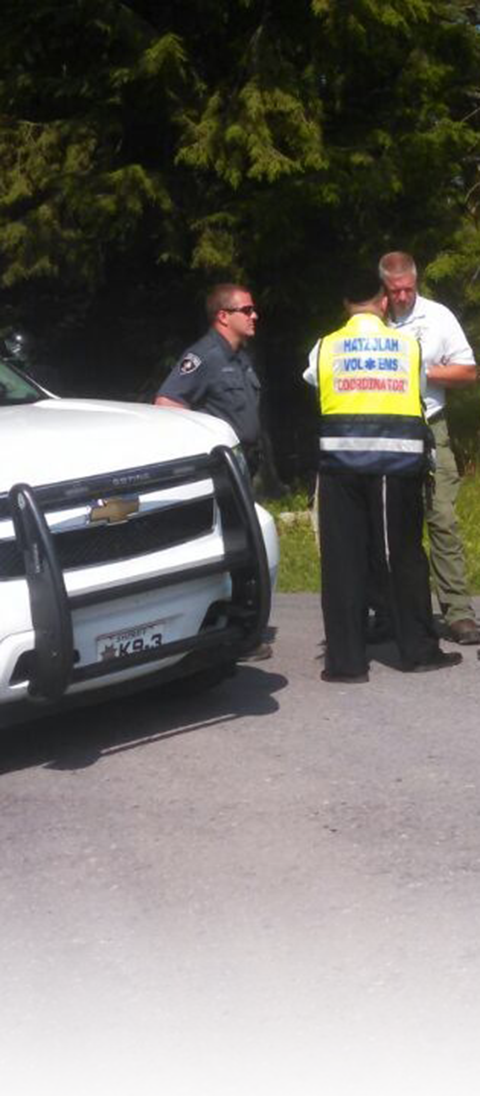The member speaks
He dedicates the summer to answering your call. So why doesn't he want anything in return?
"I've been a Catskills Hatzalah volunteer for nearly twenty years," says Menachem Holtz. "and whenever I look back at the early days of Catskills Hatzalah, it amazes me how much the organization has grown and how it responds to so many serious calls. Not only during the busy summer season, but actually throughout the year."
Menachem is an insurance broker by trade. His neatly trimmed salt-and-pepper beard stand to contrast his youthful features and lively personality. Every summer his family relocates to their summer home in Loch Sheldrake, where Menachem sets up shop in his "bungalow office" as he likes to call it and spends the day alternating between reviewing insurance paperwork and responding to medical emergencies in the vicinity.
"Things have definitely come a long way," he reminisces with a broad grin. "Back then, because we couldn't afford long-range antennas to broadcast the dispatches normally, listening to calls on the radio was sort of like hearing a radio station from some foreign country. The transmission was always very crackly and punctuated with lots of static. Deciphering what was being announced on the radio became something of an art. It was just like playing broken telephone. But of course, it was no game. No way. A fellow human being's life was at stake."
Over the past two decades, Menachem witnessed many improvements throughout the inner workings of Catskills Hatzalah. a costly state-of-the-art radio dispatch system was installed, utilizing advanced wireless technology to provide a wider coverage area for receiving emergency radio communications.
"Today, Catskills Hatzalah ensures the safety of over 300 colonies and summer camps spread across a radius of over 1,000 square miles," he continues. "As we steadily grew in both size and capabilities, first responders like myself faced another problem. We had no idea where some of these call were happening. I mean, realistically speaking, how can anybody be expected to know about every little country road and narrow side street?"
Catskills Hatzalah operates year-round in the Sullivan County region to benefit the families who permanently reside upstate, along with those who frequently spend weekends in their vacation homes - lodgings that haphazardly dot the sprawling Catskills topography. Menachem continues his recollection about what traveling to an emergency call entailed.
"Finding these way-out places was almost impossible," emphasizes Menachem. "To combat this problem, we created the Catskills Hatzalah Summer map, which was designed specifically to boost our emergency response times, and since then, none of us have ever gotten lost on a call again. Being that we're always looking for ways to speed up our response, we've also integrated this special map with modern GPS technology. So locating some obscure dirt road when you're on a Hatzalah call in the pitch-black darkness at 3 AM becomes much easier.”
This past summer, Menachem and his fellow Catskills Hatzalah volunteers responded to more than 2,000 emergency calls – many of which would have ended tragically – if not for their quick response times, lifesaving medical equipment and 13 state-of-the-art ambulances strategically situated throughout the Catskill Mountains.
"We didn't always have a first-rate fleet of modern ambulances," notes Menachem. "I remember responding to a call in our old 1986 Ford ambulance on a blistering summer day. To say that the air conditioning worked poorly is an understatement. I think it was hotter inside that ambulance then it was outside. And when it came to going up a steep hill? Forget about it! You needed to say a special Tefilas HaDerech that the transmission wouldn't blow before reaching the top. Thankfully, those days are over.The new ambulances we have cost over $170,000 each. Yes, it's a lot of money. But worth every penny. The reality is, they've helped Catskills Hatzalah respond to calls faster, save countless lives and care for our patients better."
Although it took a tremendous chunk out of Catskills Hatzalah’s annual budget, the construction of the new Catskills Hatzalah garage in South Fallsburg significantly improved the organization's lifesaving services. With training areas that allow Menachem to stay updated on the latest advances in emergency medicine, an equipment storage area for him to stock up on lifesaving medical equipment, and large ambulance bays that protect the expensive ambulances from external elements by keeping them sheltered in the winter, Menachem is in a better position to help save lives.
"As a Catskills Hatzalah volunteer, I don't expect any thanks or recognition for what I do," he concludes. "My job is just to help others in their time of crisis. But I can't do it alone. Without the generous support of the folks that we help, our lifesaving services would abruptly come to an end. all we need is for everybody who's spending their summer in the Catskills to contribute generously toward the cause. given alone, it doesn't seem like much. But by joining together with your neighbors and friends, it'll spell the difference between life and death. And only you can help us make that difference."
Back To All Inside Stories
